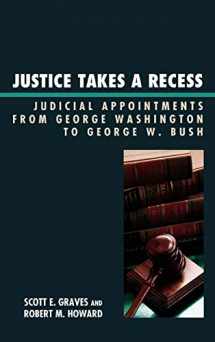
Justice Takes a Recess: Judicial Recess Appointments from George Washington to George W. Bush
ISBN-13:
9780739126615
ISBN-10:
073912661X
Author:
Robert M. Howard, Scott E. Graves
Publication date:
2009
Publisher:
Lexington Books
Format:
Hardcover
126 pages
Category:
Civil Procedure
,
Rules & Procedures
FREE US shipping
Book details
ISBN-13:
9780739126615
ISBN-10:
073912661X
Author:
Robert M. Howard, Scott E. Graves
Publication date:
2009
Publisher:
Lexington Books
Format:
Hardcover
126 pages
Category:
Civil Procedure
,
Rules & Procedures
Summary
Justice Takes a Recess: Judicial Recess Appointments from George Washington to George W. Bush (ISBN-13: 9780739126615 and ISBN-10: 073912661X), written by authors
Robert M. Howard, Scott E. Graves, was published by Lexington Books in 2009.
With an overall rating of 4.5 stars, it's a notable title among other
Civil Procedure
(Rules & Procedures) books. You can easily purchase or rent Justice Takes a Recess: Judicial Recess Appointments from George Washington to George W. Bush (Hardcover) from BooksRun,
along with many other new and used
Civil Procedure
books
and textbooks.
And, if you're looking to sell your copy, our current buyback offer is $0.3.
Description
The Constitution allows the president to “fill up all Vacancies that may happen during the Recess of the Senate, by granting Commissions which shall expire at the End of their next Session.” In Justice Takes a Recess, Scott E. Graves and Robert M. Howard address how presidents have used recess appointments over time and whether the independence of judicial recess appointees is compromised. They argue that these appointments can upset the separation of powers envisioned by the Framers, shifting power away from one branch of government and toward another.Examining every judicial recess appointment from 1789 to 2005, the authors discover that presidents are conditionally strategic when they unilaterally appoint federal judges during Senate recesses. Such appointments were made cautiously for most of the twentieth century, leading to a virtual moratorium for several decades, until three recent recess appointments to the courts in the face of Senate obstruction revived the controversy. These appointments suggest the beginning of a more assertive use of recess appointments in the increasingly politicized activity of staffing the federal courts. The authors argue that the recess appointment clause, as it pertains to the judiciary, is no longer necessary or desirable. The strategic use of such appointments by strong presidents to shift judicial ideology, combined with the lack of independence exhibited by judicial recess appointments, results in recess power that threatens constitutional features of the judicial branch.


We would LOVE it if you could help us and other readers by reviewing the book
Book review

Congratulations! We have received your book review.
{user}
{createdAt}
by {truncated_author}


